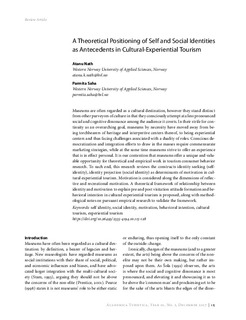A Theoretical Positioning of Self and Social Identities as Antecedents in Cultural Experiential Tourism
Journal article, Peer reviewed
Published version
Permanent lenke
http://hdl.handle.net/11250/2492868Utgivelsesdato
2017Metadata
Vis full innførselSamlinger
Originalversjon
Academica Turistica - Tourism and Innovation Journal. 2017, 10 (2), 115-128. 10.26493/2335-4194.10.115-128Sammendrag
Museums are often regarded as a cultural destination, however they stand distinct from other purveyors of culture in that they consciously attempt at a less pronounced social and cognitive dissonance among the audience it covets. In their strife for continuity as an overarching goal, museums by necessity have moved away from being torchbearers of heritage and interpretive centers thereof, to being experiential centers and thus facing challenges associated with a duality of roles. Conscious democratization and integration efforts to draw in the masses require commensurate marketing strategies, while at the same time museums strive to offer an experience that is in effect personal. It is our contention that museums offer an unique and valuable opportunity for theoretical and empirical work in tourism consumer behavior research. To such end, this research reviews the constructs identity seeking (self-identity), identity projection (social identity) as determinants of motivation in cultural experiential tourism. Motivation is considered along the dimensions of reflective and recreational motivation. A theoretical framework of relationship between identity and motivation to explain pre and post visitation attitude formation and behavioral intention in cultural experiential tourism is proposed, along with methodological notes on pursuant empirical research to validate the framework.

